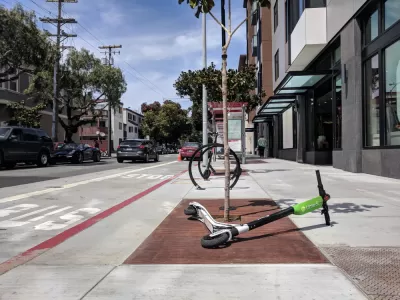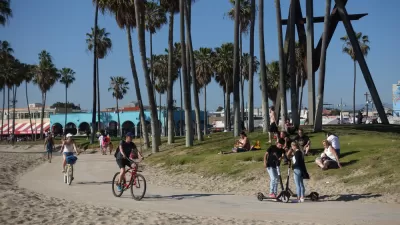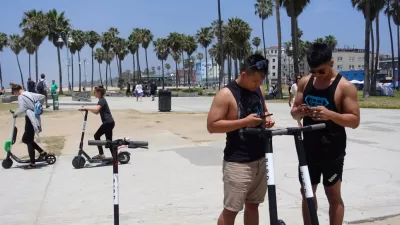Electric scooters in Portland will pay a road fee, but according to this article, cities would do well to hold cars to the same standard as scooters.

[Updated August 7, 2018] E-scooter companies are going to start paying a fee for road use in Portland. Joe Cortright argues cars should too. When Seattle gets scooter share from Lime, the company will pay a $365 yearly fee to support street maintenance. Cortright argues cars should be asked to do the same.
"Scooters are smaller and cleaner than cars. A scooter occupies only a tiny fraction of the space occupied by a typical automobile," Joe Cortright writes for City Observatory. It seems only fair to Cortright that the city ask for a similar or larger fee from drivers. "If they each paid a dollar a day toward the cost of city streets, that would work out to about $365 per day, which is more than triple the amount of money that the State of Oregon (not the city) charges as an annual vehicle registration fee," Cortright argues.
Beyond space considerations, there are maintenance costs to consider, a vehicle that weighs close to a ton is going to put a lot more wear on a street than a 25-pound scooter. Some cities charge more than Portland for city stickers and city sticker tickets. In Chicago, policies that have increased those costs have lead to bankruptcies. Still, if cities are serious about climate change, a higher yearly cost for drivers maybe a way to get more walkers, bikers, and scooter riders.
[The post was corrected to reflect the correct location for the scooter fee policy. The previous version fo the post erroneously located the policy news in Seattle.]
FULL STORY: E-Scooters and Paying for Roads

Planetizen Federal Action Tracker
A weekly monitor of how Trump’s orders and actions are impacting planners and planning in America.

Map: Where Senate Republicans Want to Sell Your Public Lands
For public land advocates, the Senate Republicans’ proposal to sell millions of acres of public land in the West is “the biggest fight of their careers.”

Restaurant Patios Were a Pandemic Win — Why Were They so Hard to Keep?
Social distancing requirements and changes in travel patterns prompted cities to pilot new uses for street and sidewalk space. Then it got complicated.

Platform Pilsner: Vancouver Transit Agency Releases... a Beer?
TransLink will receive a portion of every sale of the four-pack.

Toronto Weighs Cheaper Transit, Parking Hikes for Major Events
Special event rates would take effect during large festivals, sports games and concerts to ‘discourage driving, manage congestion and free up space for transit.”

Berlin to Consider Car-Free Zone Larger Than Manhattan
The area bound by the 22-mile Ringbahn would still allow 12 uses of a private automobile per year per person, and several other exemptions.
Urban Design for Planners 1: Software Tools
This six-course series explores essential urban design concepts using open source software and equips planners with the tools they need to participate fully in the urban design process.
Planning for Universal Design
Learn the tools for implementing Universal Design in planning regulations.
Heyer Gruel & Associates PA
JM Goldson LLC
Custer County Colorado
City of Camden Redevelopment Agency
City of Astoria
Transportation Research & Education Center (TREC) at Portland State University
Camden Redevelopment Agency
City of Claremont
Municipality of Princeton (NJ)





























